|
Several years ago I started picking one word as my guide for the year. There were a few candidates for this year but one I kept coming back to: BELIEVE. The last couple of years were tough on so many levels and last year particularly kicked my behind both personally and professionally. My self-confidence took a beating. I've been working hard to pull myself out of that rut and BELIEVE is the word I keep coming back to. Believe in my creativity, believe in my ability, believe in myself. As for the two crochet buddies, the goldfish is, of course, a nod to Ted Lasso because really, that show is brilliant and he's a perfect reminder to focus on the present. The purple dude? Because monsters aren't so scary when they're purple and smell of lavender.  There's something amazing about starting a new year with a new writing project. I've spent the last few weeks mulling over story ideas and getting to know the characters better. Today was all about words. Fun words! This one feels different from my books and along with that, I've given myself permission to play with my process. That freedom is liberating and a wonderful, much needed reminder, that I started writing because I love telling stories.
0 Comments
Last week I mentioned jumping into a new writing project while waiting for the next round of edits to come in. Yesterday, that email came in and with it, a panic attack. What direction do I go now? Story 1 which I've been working on for several years, have a strong emotional connection with (it's loosely based on a family friend), and spent the past month thinking about little else while I was rewriting. Or Story 2 which is fun and different from anything else I've written and fits with the current market. It still lives in my brain where it's shiny and perfect and not tainted yet by my fumbling attempts at setting it to paper. It shouldn't be a difficult decision. And yet ... I've spent the better part of the last two days paralyzed over what to do.
Why? Because one is a shorter path to the desired result of having a manuscript to submit while the other allows more time to meander and avoid that next step in the journey. What if story 2 is more marketable than story 1? What if, after all that additional work, story 1 still isn't quite good enough? What if ... But at some point, a decision has to be made. Sure, you can abort mission, turn around and take an entirely different path. That new path will, inevitably, lead you to yet another fork. Self-doubt is a heavy stone to carry on that journey. Failure, however, is a boulder that will crush you. For me, failure is leaving behind a trail of unfinished projects. For another writer, it could be something else entirely. There are no guarantees what the view will be at the end of any of those paths. Publishing is certainly not the easiest road any of us could have chosen to take. But, as a friend reminded me, "you need to honor the investment." For me, that means following Story 1 to the end of its path and, even if the view at the end isn't what I'd hoped, at least I didn't leave an unfinished heap along the way. 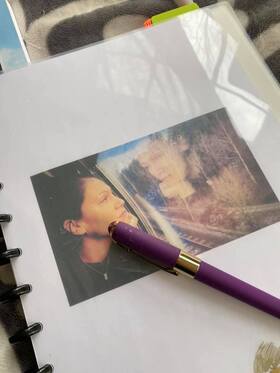 I sent the revision back to the editor I'm working with yesterday (and totally failed to post a new blog as a result). Revision is stretching it a bit ... I basically rewrote the entire book - in 5 weeks! I've never written so much in such a short time. My brain is mush, my bum is numb, my eyes burn. And honestly, the only thing I wanted to do after hitting that send button was collapse on the couch and binge watch Firefly Lane. Okay, okay, and clean my house because it's been totally neglected for 5 weeks (well, that doesn't count as "wanted to do" but details!!). The editor, however, not only inspired a fresh direction for the manuscript, she also re-ignited my creative spark. I seriously had every intention of taking a week off to read, clean, catch up on work I've let slide. But there are a couple of stories that just won't leave me alone and this morning, I jumped into a new project. After a long writing slump where I doubted every word that came out of my fingers, it's a good feeling to want to write. And I'm crazy excited about this new project. It's been bubbling in my brain for a couple of years now. So yeah, logically, a rest makes sense. But I'm going to ride this wave while it's hot. I can hang on the beach and rest when the waves die down. :-) I have a love-hate relationship with word counts. If you've read any of my posts, you know I'm planner. I like my project plans and deadlines and those, obviously, include how many words I need to write on any given day in order to meet said deadlines.
When I started this crazy month-long rewrite, I calculated that I'd need to write about 3,000 words a day. Now, for me, that's insane. I've attempted NaNoWriMo on numerous occasions but never completed it (although, truth be told, I've never been at the starting point of a manuscript when November rolled around; somehow I'm always revising). But this time, I didn't have a choice. So I took a dry erase calendar and marked down how many words I needed per day, giving myself a smaller count on days I knew I had less time, and more words on the days I didn't have to go anywhere. Every day, I write how many words I did that day as well as the total for the manuscript. Here's why ... Some days, the words flow and I crush my goal. But, predictably, there are days when I feel like I'm deleting more than I'm writing. Seeing the low number under the goal frustrates me. On those days, especially, I focus on the total word count for the manuscript. Seeing how much I've actually managed to write in a short period is the boost I need to keep going. If I only focused on the less-than numbers, it would be too easy to see the failure. So, yeah, I cringe when setting word count goals, but I also know it's a necessary part of the process for me.  Last week, I mentioned the editorial feedback that sent me into a wee bit of a tailspin and a not so wee rewrite. What happens when a pantser who learns about her story through writing the draft has to write a new draft in one month? She tightens channels her inner nerd and plots. Step 1: Take notes on the editorial letter. I highlighted the feedback that jumped out and waved a "me, me" flag. And I prioritized the big changes and the not so big but still important ones. Step 2: Decide what stays. There were scenes or details in the original that I wanted to keep so those pages got marked. Whenever I pulled a scene from the old version, I'd mark what new chapter it went into. By the time I'm done with the rewrite, all of those stickies will have been discarded. 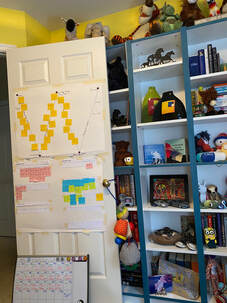 Step 3: Planning Boards. I pulled out the lovely W-plot chart that, honestly, I haven't used in a couple of manuscripts. Each yellow sticky is a finished chapter. Because my story revolves around a specific timeline, I printed calendar sheets and used the pink stickies to help track when things are happening. The blue and green stickies are chapter/scene notes that are still to be written and when I think they'll happen. Once the become real scenes, I transfer that information to a yellow note and up on the W graph it goes. And that bottom calendar is to keep me honest on progress. It's insanely satisfying seeing the number grow. Bonus, it's given me a far better appreciation for what I can achieve and and what affects my productivity. What have I learned from this process?
I have a confession ... I was silly excited to get my editorial letter last month. I decided to work with a developmental editor after hitting a pretty nasty crisis of confidence. The manuscript wasn't bad but it also wasn't as good as I knew it could be.
So, yeah, I was expecting some substantial changes. And then came the email ... dum, dum, dum ... 10 pages, single-spaced of editorial notes and embedded notes within the manuscript itself (multiple notes on pretty much every page). I read the letter, then read it again. And then I cried. She'd been able to get into my head and extract the story I'd wanted to write. I read the editorial again, this time with highlighters. I pulled out my W plot board and sticky notes (matching colors to the highlighters), and fresh storyboard pages and sat down to map out the edits. For those who've read any of my writing blog posts, you know I'm not a plotter when drafting. I am, however, a planner when it comes to revisions. This is when my inner nerd comes out. But the more I looked at the structure, the clearer it became that the book I wanted to write wasn't really the book I'd written. Instead of revising existing pages, I opened a new word document and started with Chapter One. There are passages that I'm cutting and pasting into the new document but most is new writing. I've never written so many words in such a short period of time and there are still plenty of times when I catch myself doubting the direction I'm going. But I can honestly say, I've also never been this excited about dumping more than 2/3 of a manuscript. In addition to starting a notebook for each project, I also create a Pinterest board. During the drafting phase, I keep the board private because I'm superstitious (don't judge!) and I don't like sharing story information before the story is ready for prime time.
The types of images I save: locations, objects that pique my interest and have a part in the story (even if only a small mention), animals that remind me of a character in the book, recipes, or anything else that fits with the story. The one thing you won't find, though ... photos representing the various characters. I've always resisted putting an actual face to the people in my mind. Likewise when I read, I don't want someone else's vision hijacking my imagination. You can check out the story boards for The Distance Home and Carousel Beach, and see the images that inspired me during the writing process. Whenever a story idea nestles in my brain, I start a project notebook for it. These notebooks become my keep-all from initial brainstorming through final revisions.
What's in them? 1) Notes. I include everything that comes to mind here - all of my "what if" or "this could happen" thoughts as well as research on various topics related to the story. This is where I also keep a copy of the back cover blurb, the synopsis, and whatever Mindmaps I've created. 2) Timeline I always print a calendar for the year the book will take place and track chapters. I learned the hard way that it's far too easy to clip along with a story, not paying attention to what day things are happening until your characters are going to work on Saturday morning when they work a traditional Monday - Friday job (yeah, I know, those don't really exist anymore), or I lose track of how much time has gone by. 3) Storyboards Every morning before I start to write, I brainstorm what the current chapter is about. I don't re-read what I've written (too easy to get sucked into triple guessing and revising), but having the notes in the storyboard, helps propel me forward. 4) A miscellaneous tab Here's where I keep track of my beta readers and folks who've helped with the book. Another lesson I learned the hard way ... by the time I'm writing the acknowledgements page for one project, I'm usually armpit deep in another and can barely remember who I am much less who helped me with this particular project. I'll also write down any creative marketing ideas I've come across that would be relevant for that project. And, of course ... 5) A photo that takes me immediately into the story. Writing a book isn't different from any other project. There are steps to take, milestones to meet. When I first started, I savored every step. Finishing a first draft was HUGE. Finishing a round of revisions, wine time. Getting a request from an agent, pop that champagne.
Somewhere along the way, those individual milestones seemed to merge into one long to-do. I'd barely get one done and I'd already be racing into the next. I'd finish one manuscript and immediately dive into the next one. "No rest for the wicked," I'd joke. But here's the problem with that ... writing is creative (duh, I know) and creativity needs to be nurtured (something I clearly suck at). By not taking time to appreciate each milestone, I'd turned writing into one long slog. And there's only so long you can slog before mental exhaustion makes every word too heavy to carry one step further. That's where you'll find me, sitting at the bottom of the hill, the fork in the path from one completed project and the start of a new one. Normally, I'd take a deep breath (a quick one) and plod on up the hill with my new story ideas pushing me along. This week, I got to that fork after sending the manuscript to the editor and immediately turned to attack the next steps. But no, not this time. Maybe because I'm too drained from a year (okay, years if we're honest) of non-stop slogging and frustrations. Maybe because I miss enjoying the process. This week, I chose not to continue up that next path immediately. I chose to honor that process, to enjoy the big fat notebook that is a completed draft of a book. I'm not stressing about the next step (okay maybe a little). For the first time in a very long time, I'm giving myself the time to celebrate a milestone.  I'm a planning nerd. A fresh new date planner makes me weak in the knees and a Gantt chart makes me positively giddy. Much of that comes from my days in the corporate world where yearly budgets and marketing plans were part of the job. So when I switched to writing, I took some of that nerdiness with me. How does it work for a writer? Mission statement When I first started, I wrote out a mission statement: write stories with the honesty and heart to touch readers. I didn't say be a best selling author or make enough money to buy that dream car. I can fantasize about those all I want, but they're not within my control. But being the kind of writer who produces meaningful stories, that I can control. I know, you're thinking, "seriously? you wasted time on that?" There have been many times over the years that I've doubted why I continue to do this. When rejections pile up or a crappy review hits hard, I look at that mission statement and adjust my focus. What will I accomplish this year I need goals. Goals motivate me and keep me focused. At the beginning of each year, I look back at what I accomplished the year before, what didn't go to plan and why. After that, I make a list of the things I'd like to accomplish. Those, my friends, are NOT my goals for the year. I have big eyes when it comes to wanting to do. There are so many story ideas, so many projects I want to take on. Goals need to be attainable, otherwise you're setting yourself up for frustration and failure. I take that wish list and give it a healthy reality check. I factor in trips that I already know about or anticipate happening, other projects that will take chunks of time, family schedules, and the biggest factor, my process. There are writers who can crank out a book in 6 months or less. That is not me, that will never be me. Okay, never say never but I'm pretty sure that's not in the cards for me. I pick apart the wish list and take the three or four projects I want to focus on. That usually includes finishing up with a previously started manuscript (I seem to be on a schedule that has me in the final editing at the beginning of each year), starting something completely new, and then I'll add one or two additional projects that I've been wanting to tackle (maybe it's a first draft of a book in a new-to-me genre, or starting research on yet another project). Where do I want to be in 5 years Here's where I allow myself a bit of fantasizing. Some of what gets put in this section I can control, some I can't. But even with the items I can't control (making a best of list, securing new contracts, etc), I know the steps to get there. Those are the carrots that push me to past the speed bumps. What resources do I need to achieve those goals Here again, I generally start with a wish list then switch out the princess glasses for ones grounded in reality. What kind of marketing/publicity support do I need and what are the options? Do I need to redo my website or have photos taken? What about attending writer retreats/conferences? Any research trips? What workshops or webinars do I want to attend?What time do I need in order to achieve my goals? Having a business plan and revisiting it at the beginning of each year is me taking myself seriously. It's what I need to stay focused and move my writing career forward. Yesterday, I sat down and set my goals for the year. 2021 will be fun! |
musings from the mugThoughts on writing, reading, parenting, pets, coffee, crocheting, and life in general. Archives
January 2022
Categories
All
|
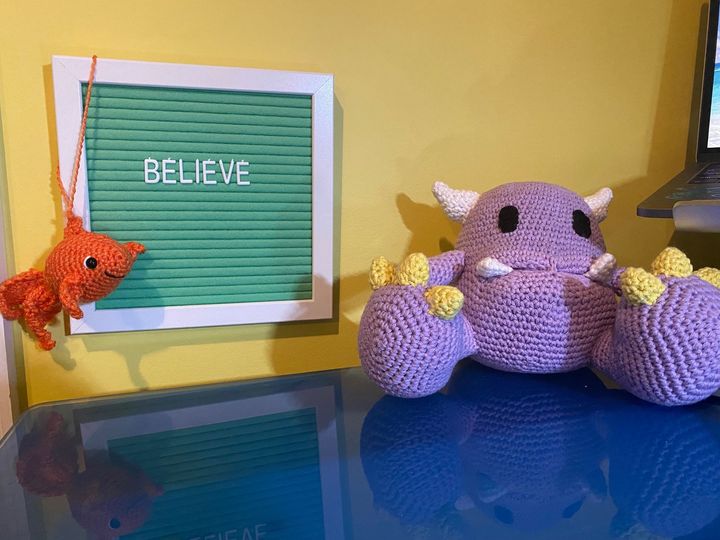
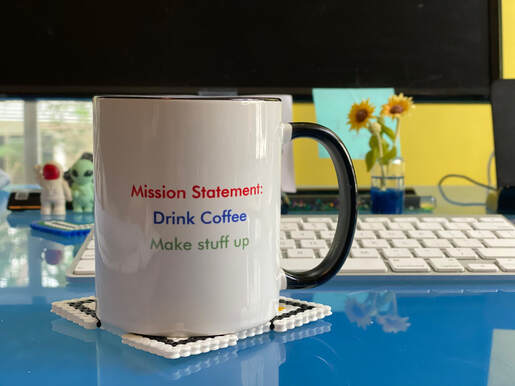
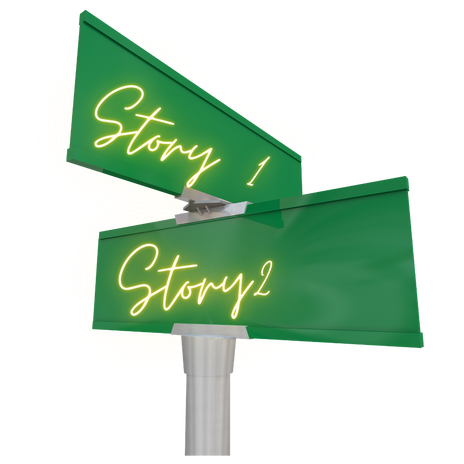
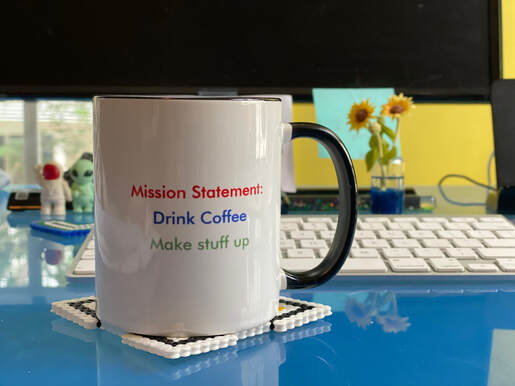
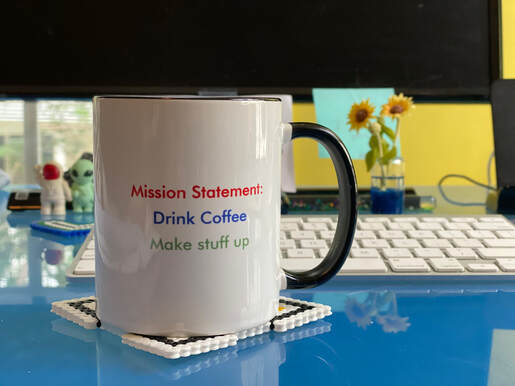
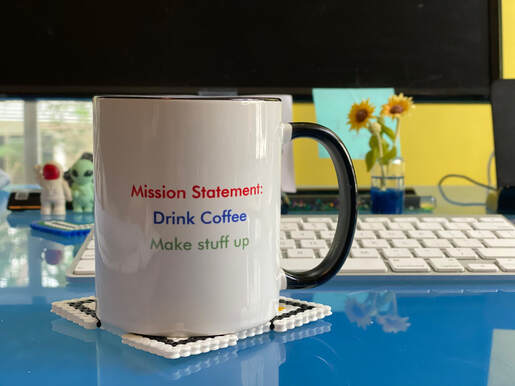








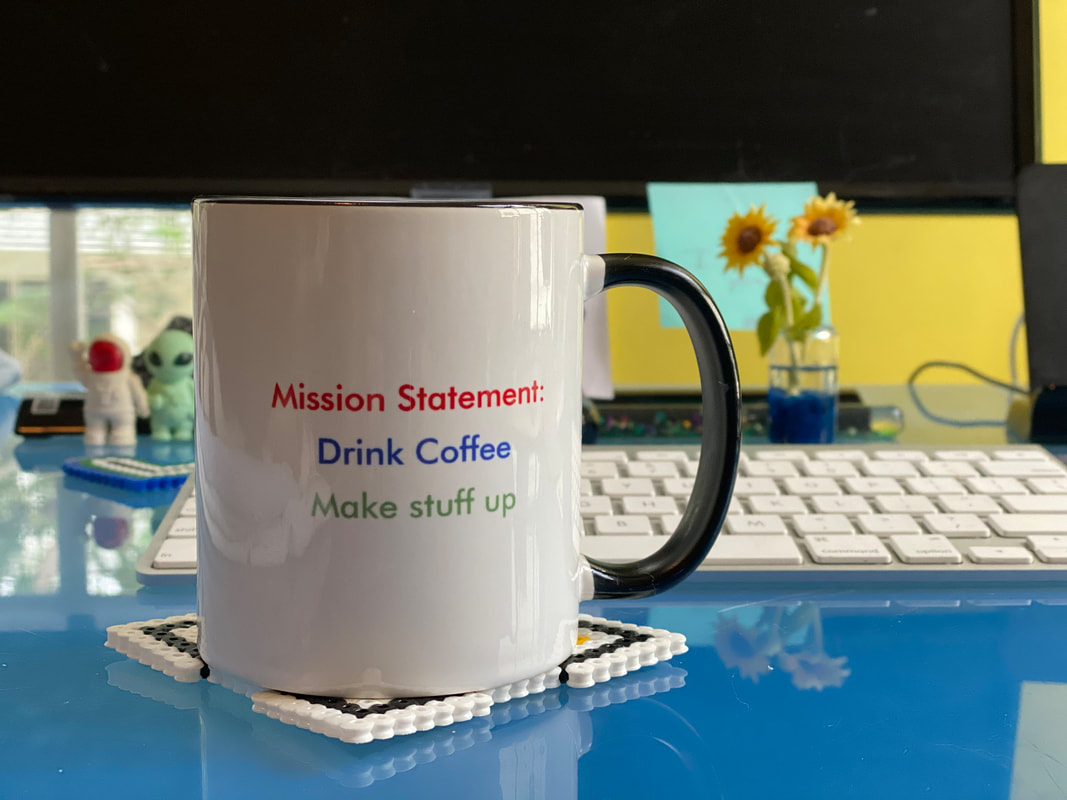
 RSS Feed
RSS Feed